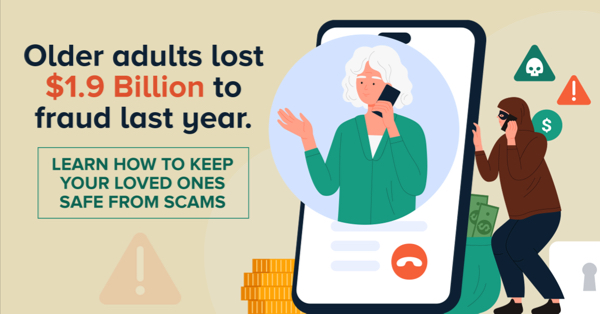Older adults lost a reported $1.9 billion… yes, BILLION… to fraud last year.
A new report from the Federal Trade Commission, says, because most cases of fraud are not reported, the actual number is likely much higher. The report says older adults were:
- more than five times more likely than younger groups of people to report losing money to a tech support scam.
- almost three times as likely to report a loss to a prize, lottery or sweepstakes scam.
- approximately 53% more likely to report losing money to a friend or family impersonation scam.
“Seniors who live alone, have memory issues or don’t understand technology are especially vulnerable. It’s shameful,” said said Austin Blilie, Chief Operating Officer at Trail Ridge Home Care’s parent organization, ABHM. “Scammers are becoming increasingly sophisticated, so it’s important that we help our senior loved ones understand the risks and take steps to avoid becoming a victim.”
According to the National Institute on Aging, these are the most common scams that target older adults.
Government impersonator scams, such as someone posing as a Medicare or Social Security representative asking for account information.
Fake prize, sweepstakes and lottery scams, in which the senior is asked to pay money or provide account information to claim winnings.
Computer tech support scams, in which the scammer says the senior’s computer has a problem and wants him/her to pay for support services to fix it.
The grandparent scam, in which a caller pretends to be a grandchild or other relative in need of help.
So, how can you keep your aging loved ones safe from scammers? Experts advise encouraging them to:
- Never give out sensitive personal information (Social Security number, bank account information, credit card numbers, etc.) over the phone or in response to an email, social media post or text message.
- Check bills for charges that weren’t authorized.
- Protect electronic accounts by keeping the security software on up to date, use strong passwords and use multi-factor authentication when possible.
- Never transfer money, buy gift cards or pay someone over the phone.
- If something seems off, end the conversation – don’t give in to threats or pressure.
“While we certainly can’t stop scammers from targeting seniors, our professional caregivers are trained to watch for red flags,” Blilie said. “If time or distance keeps you from spending as much time as you would like with your aging loved ones, we can help make them aware of suspicious online activity, listen for unusual phone conversations and more. We’ll alert you immediately if we suspect problems.”
For more information about Trail Ridge Home Care’s customized care plans, visit TrailRidgeHomeCare.com
If you suspect your aging loved one has been the victim of a scam, these organizations can help – The National Adult Protective Services Association, eldercare.gov, The National Center on Elder Abuse, AARP Foundation Elderwatch and the Federal Trade Commission.
